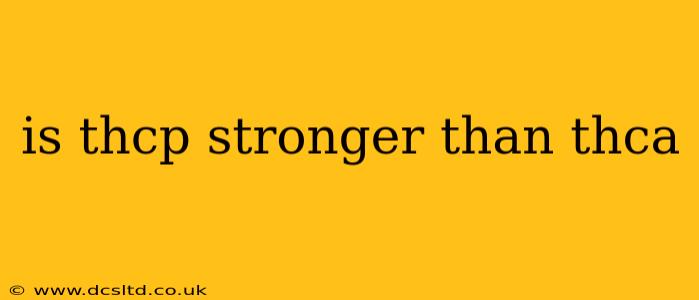The world of cannabinoids is constantly expanding, with new compounds like THCP emerging and challenging our understanding of cannabis's effects. One frequently asked question is: Is THCP stronger than THCA? The answer isn't a simple yes or no, but rather a nuanced exploration of their unique properties and interactions within the body.
While both THCA (tetrahydrocannabinolic acid) and THCP (tetrahydrocannabiphorol) are naturally occurring in the cannabis plant, they interact with our endocannabinoid system (ECS) in different ways, leading to varying effects. Let's delve deeper.
What is THCA?
THCA is the non-psychoactive precursor to THC (delta-9-tetrahydrocannabinol), the primary psychoactive compound in cannabis. It's found abundantly in fresh cannabis buds and doesn't produce a "high" until it's decarboxylated (heated), converting it into THC. THCA is often touted for its potential anti-inflammatory and analgesic properties. Research is ongoing, but early studies suggest it might have a range of therapeutic benefits.
What is THCP?
THCP is a relatively newer cannabinoid discovered in 2019. Its chemical structure is similar to THC, but with a crucial difference: a longer alkyl side chain. This subtle structural variation significantly impacts how it interacts with the CB1 receptors in the brain, which are responsible for many of the psychoactive effects of cannabis.
Is THCP Stronger Than THCA? A Comparative Analysis
The key difference lies in the potency and type of effects. While THCA's effects are generally considered milder and non-psychoactive before decarboxylation, THCP is reported to be significantly more potent than THC. Studies suggest it binds to CB1 receptors with much greater affinity, potentially leading to more intense psychoactive experiences. This means that even smaller amounts of THCP could produce stronger effects compared to a similar amount of THC. Since THCA needs to be converted to THC to be psychoactive, a direct comparison in terms of potency is only relevant once THCA is decarboxylated.
Direct Comparison:
- Potency: THCP is significantly more potent than THC, and therefore, more potent than decarboxylated THCA.
- Effects: While both THCP and THC produce psychoactive effects, the intensity and duration might differ. THCP's effects are often described as more potent and longer-lasting.
- Medical Potential: Research on both THCA and THCP is still in its early stages, so definitively comparing their potential medical benefits is premature. However, both show promise in various therapeutic applications.
People Also Ask: Addressing Common Queries
Here are some frequently asked questions about THCP and THCA, clarified:
How does THCP differ from THC?
The main difference lies in the alkyl side chain. THCP has a longer side chain, resulting in a stronger binding affinity to the CB1 receptors in the brain compared to THC. This enhanced binding explains its reported higher potency.
What are the potential benefits of THCP?
Like other cannabinoids, THCP's potential benefits are still being investigated. However, some suggest it may have similar therapeutic applications to THC, potentially offering stronger pain relief, anti-inflammatory effects, and appetite stimulation, though more research is needed.
Is THCP legal?
The legality of THCP varies depending on local and national regulations. Many jurisdictions have laws focusing on THC content, and the legal status of THCP is often unclear. Always check local laws before consuming or possessing any cannabis-derived products.
Where can I find THCP?
THCP is a relatively new cannabinoid, and its availability may be limited compared to more established cannabinoids like THC and CBD. You might find it in specialized cannabis dispensaries or online retailers in jurisdictions where it is legal. Always prioritize reputable sources to ensure product quality and safety.
What are the side effects of THCP?
Like THC, THCP might cause side effects such as anxiety, paranoia, increased heart rate, and dry mouth. Individual reactions can vary, and the potential side effects can be more pronounced due to its higher potency.
In conclusion, while THCA is a non-psychoactive precursor that needs to be decarboxylated to become active, THCP is a significantly more potent cannabinoid than THC itself. Its stronger binding affinity to CB1 receptors translates to potentially more intense psychoactive effects. Further research is crucial to fully understand the therapeutic potential and risks associated with THCP. Always consult with a healthcare professional before using any cannabis-derived products, especially those containing novel cannabinoids like THCP.
